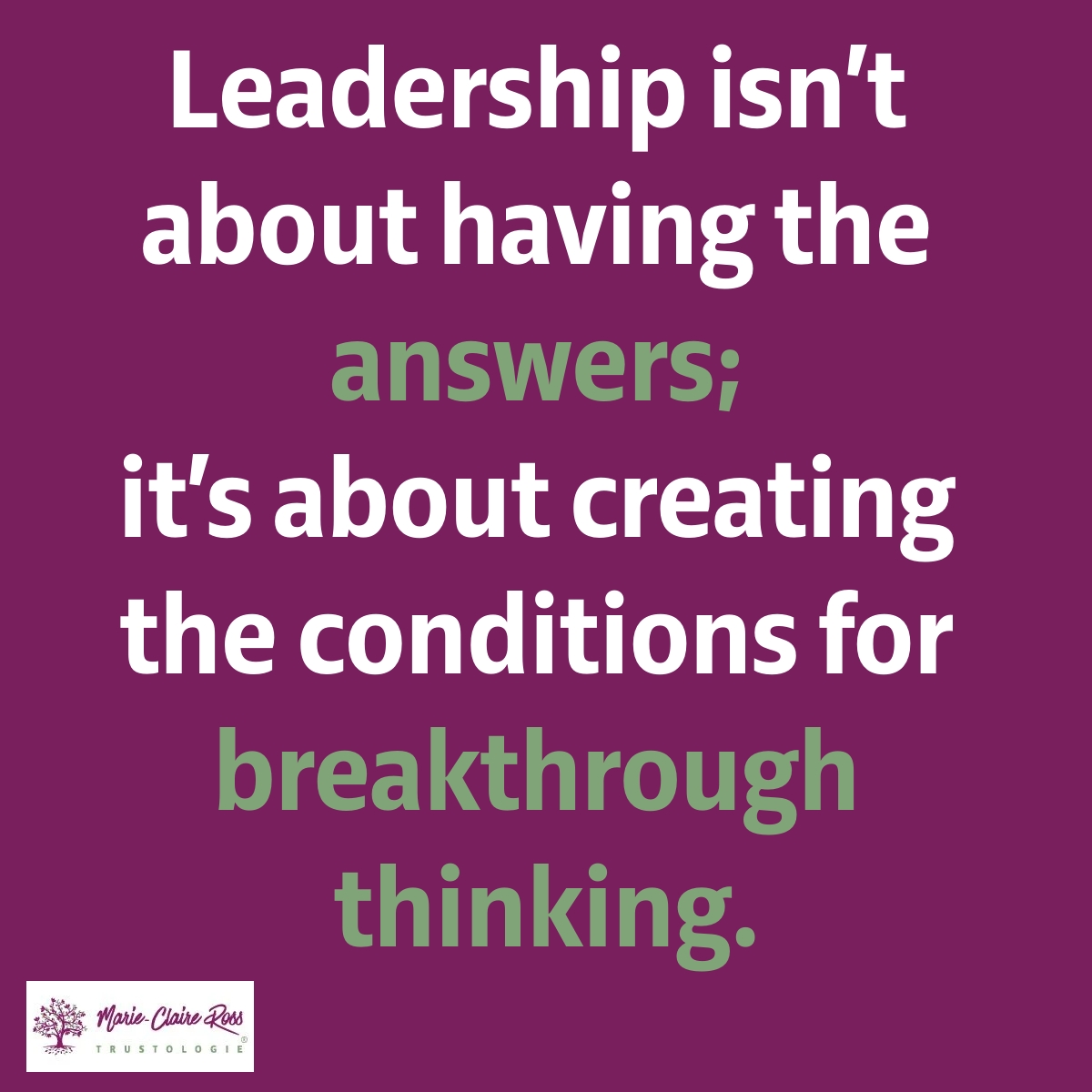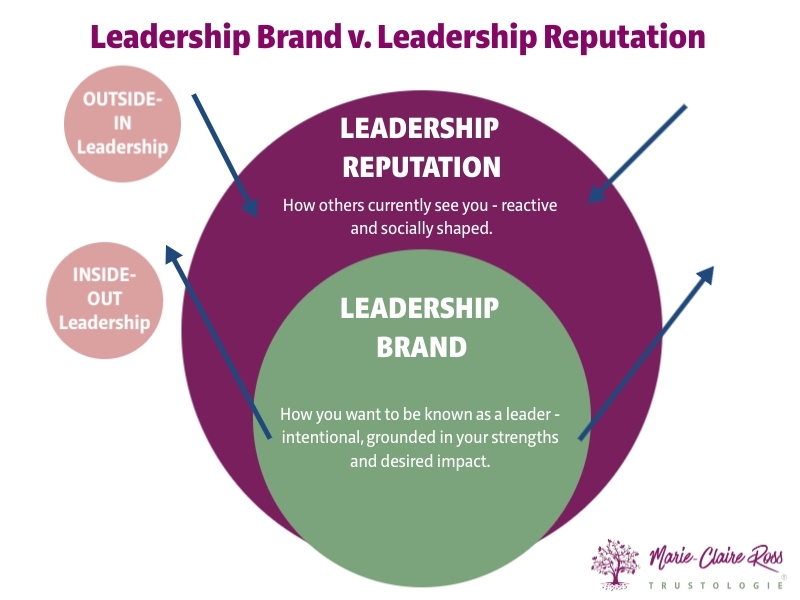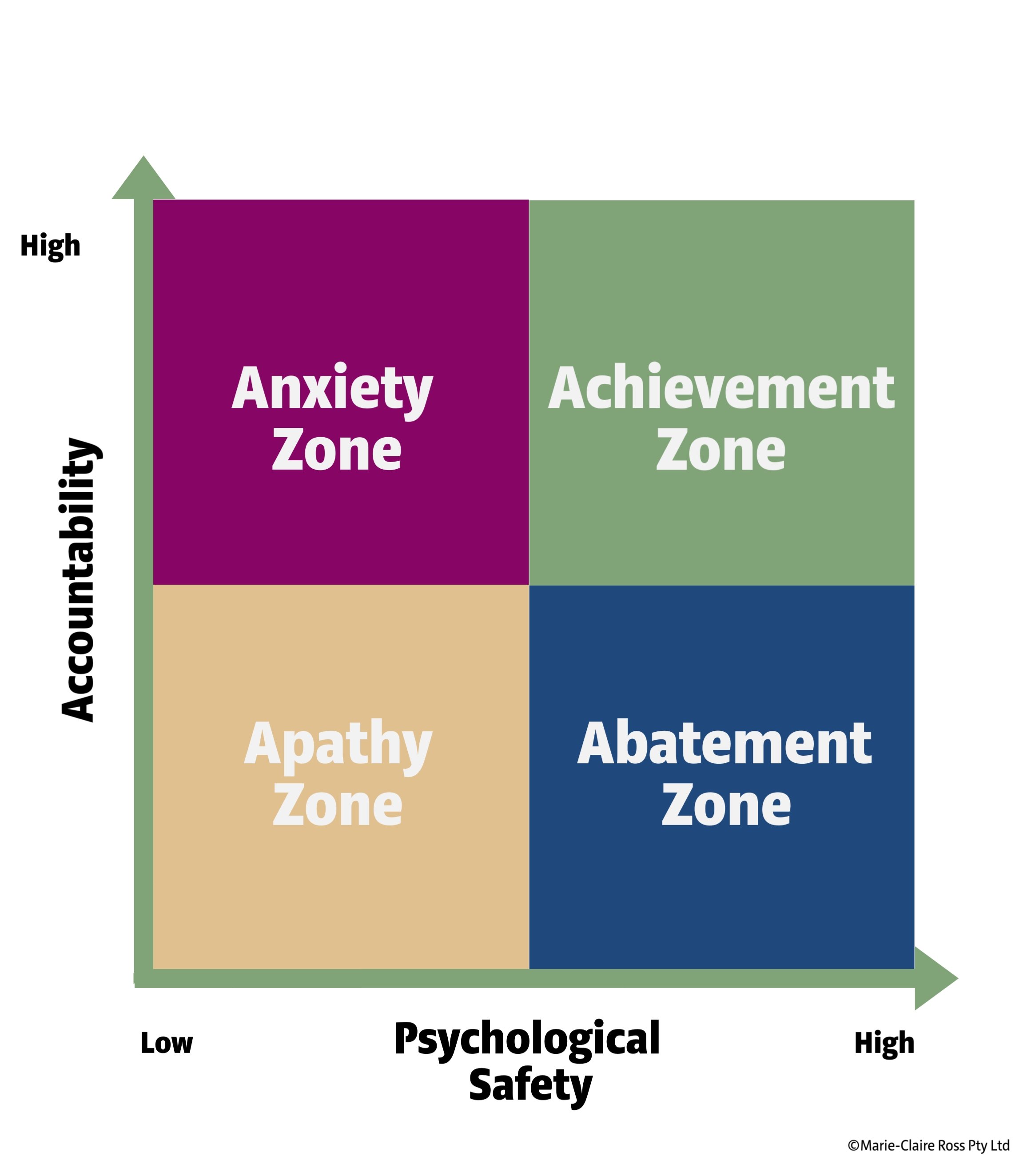7 min read
Navigating Difficult Conversations: 7 Steps for Emotionally Intelligent Leaders
Navigating difficult conversations at work isn’t just a “nice to have” leadership skill – it’s the fault line that often separates healthy,...
Develop leaders, strengthen executive teams and gain deep insights with assessments designed to accelerate trust and performance.

Transform how your leaders think and perform with keynotes that spark connection, trust and high-performance cultures.

Explore practical tools, thought-leadership and resources to help you build trusted, high-performing teams.

Trustologie® is a leadership development consultancy founded by Marie-Claire Ross, specialising in helping executives and managers build high-trust, high-performing teams.

5 min read
Marie-Claire Ross : Updated on January 21, 2026

In my executive coaching and leadership development course, I work with a lot of new and seasoned leaders to build up their confidence and trust in themselves.
Our confidence levels can ebb and flow like the tides. We get pushed and pulled into different zones depending on our mindset, challenges and issues outside of our control.
Sometimes events occur that impact our confidence. We start to doubt ourselves, our decisions and we suffer from a severe case of the FODO's (fear of disappointing others). The impact is a lack of trust in ourselves and in our leadership capabilities. People around us also start to doubt us, as we seek reassurance and advice.
The good news is that we can learn to be more confident and trust ourselves. This not only improves your work enjoyment, but ensures you are creating a thriving team environment.
Here are the four areas that I typically focus on with leaders:
As individuals, we frequently find ourselves deeply impacted by the opinions of others. This means that our emotions can easily sway us, and any feedback or critique of our work has a greater influence on us than it should.
We prioritise what other people think about us over the essence of our own energy. We look to others to validate our decisions or actions.
We all want to be seen, heard and appreciated, but this longing can lead us down the path of constantly trying to please others if we're not cautious.
In effect, we are neglecting our inner selves and allowing our lives to be dictated by the opinions and needs of others (whether expressed directly or not).
The difficulty lies in the fact that many of us have never learned the art of appreciating our own worth beyond the influence of others. Since we were children, we learnt to please our parents, teachers and adults.
The good news is that we possess the ability to understand our mental frameworks and our self-perceptions, recognise the ones that benefit us, and revolutionise the mental frameworks that do not.
There are lots of different ways to develop self-awareness. What I have found to work well for both myself and my clients is to start with a personality assessment. There are many readily available.
My favourite is the Enneagram (for its uncanny accuracy and what I use in my Enneagram coaching), but there is also DISC, Kolbe and Myer-Briggs. These help you unpack your strengths, weaknesses and why you act the way you do. Reflecting on who you are, when previously you didn't quite connect the dots to how that influences your leadership, is a game-changer.
A strong sense of purpose is closely linked to our overall well-being. It fuels our drive and motivation, propelling us towards specific outcomes and providing us with the determination to persevere.
This profound state of mind taps into our unconscious brain, ensuring that we stay focused and unaffected by detrimental habits that could hinder our progress.
The more we embrace our sense of purpose, the greater the reward becomes, overshadowing any potential distractions that may try to grab our attention.
We have stronger conviction and less anxiety around the choices we are making. A strong purpose grounds us to who we really are - so we don't get lost in other people's opinions.
One of my leadership development students, Andrea* (name has been changed), joined my program to help her control her emotions. Highly empathetic, she spent a lot of her time, protecting her team. The result was they were underperforming and complaining a lot. Andrea was exhausted and her boss was concerned that she cared more about her people's needs than getting work done. Andrea did an Enneagram assessment, then a personalised Enneagram debrief with me and worked on her purpose.
Through improving her self-knowledge, Andrea realised what she could control and what she couldn't. She also better understood her strengths and weaknesses as a leader. She let go of the frustration that management wouldn't fix the problems her team complained about. She realised the the only real authority she had was within her team not outside of it.
Previously, she had felt like she was almost carrying the weight the world. Now, she feels empowered by letting go of the external forces and focusing on what change she can make in her team and within herself.
The result is a much calmer, more confident Andrea, who management promoted to another leadership position that utilised her true strengths.
Leaders who don’t trust themselves tend to not trust others and the situation.
At a deeper level, how you trust others is a reflection of your own fears and insecurities. If you don’t trust yourself, it means you operate from fear rather than a positive and expansive outlook. You are subconsciously working to protect yourself, rather than working for the interests of your people or organisation.
What's the antidote for needing external validation? Getting in touch with our internal compass.
Trusting yourself means being able to trust your inner guidance. It's that subtle ability to listen to the knowing (positive voice, not the negative one) in your head, the knowing feeling in your gut or heart.
In the noisy, high-pressured world we live in, connecting to ourselves isn't easy nor is it something we have been taught to do.
It involves focus, intention, practice and time with ourselves. It means that we know what to do to regulate our emotions.
This could be going for a walk, meditating, doing yoga or listening to relaxing music. The more we learn to tune out the world and be at one with ourselves, the more we improve our connection to our inner guidance. And the better we become at discerning the subtle differences between feeling negative emotions versus receiving inner knowing. And from distinguishing truth from fiction.
Out of all the areas leaders choose to improve their confidence, improving capabilities tends to be the most popular.
We go to books, courses or we get a mentor or coach. We enrol in certification courses to give us more credentials to prove to the world that we are worthy.
While these are all positive, there is a warning label. And that is not to defer to experts to 'fix' you.
It's why working with an accredited ICF coach can be so much more rewarding. An expert executive coach is not allowed to tell you what's wrong with you, make assumptions about you or tell you what to do. Instead, they are there to partner with you in a thought-provoking and creative process to untap your imagination, productivity and leadership. The answers are within you. Sometimes you need someone to help you have the confidence to believe that.
If you do realise that learning more skills is where you need to go, then what is more important is to learn with the intention of not only gaining more knowledge, but self-knowledge as well. It's about thinking through the information you are given and contemplating whether you believe it and how you can apply it in a way that suits your leadership style.
It requires learning and actively talking to others about the content and sharing your experiences.
In my leadership development program, what people really value is group learning where everyone is encouraged to share their perspective and have time to reflect on their leadership behaviours. Discussions such as these help people to see that they are not alone. And sometimes, knowing that, helps leaders to quell the niggling self-doubt and fully own their leadership position.
Trusting ourselves is essential, especially when we stumble, face harsh criticism, or fall short of our goals. It's in these moments that our self-trust can waver, and our confidence can take a hit. This is detrimental to our leadership capability as our decision-making falters when we fear making the wrong choice.
Like most important things in life, trusting yourself is a journey. You'll never get to the destination. Embracing trusting yourself as a lifelong endeavour will make your life easier.
By embracing your uniqueness, learning from failures, surrounding yourself with support, and taking calculated risks, you'll unlock your true leadership potential and inspire others to do the same.
It means you see challenges as self-learning opportunities. And it makes you more empathetic, as through seeking to understand yourself, you naturally become more likely to take the time to understand others.
If you want to start trusting yourself more, I offer an Enneagram personality profile report and debrief with me. Click the link to find out more.

7 min read
Navigating difficult conversations at work isn’t just a “nice to have” leadership skill – it’s the fault line that often separates healthy,...

8 min read
When my daughter was 17 months old, she discovered a superpower: the word “Why?”For the next two years, it was her response to almost everything.

11 min read
I have a friend who often finds herself at the mercy of her emotions. Recently, she called me to rehash a confrontation she’d had with a group of...

Many leaders jump into a leadership position excited by the opportunity to help others and perform at a higher level.

In the workplace, we all know the importance of accountability as a leader. Yet, rarely do we talk about how personal responsibility drives...

True leadership presence isn’t a performance or a set of charisma hacks; it is the felt experience of who you are being in the room. By cultivating...